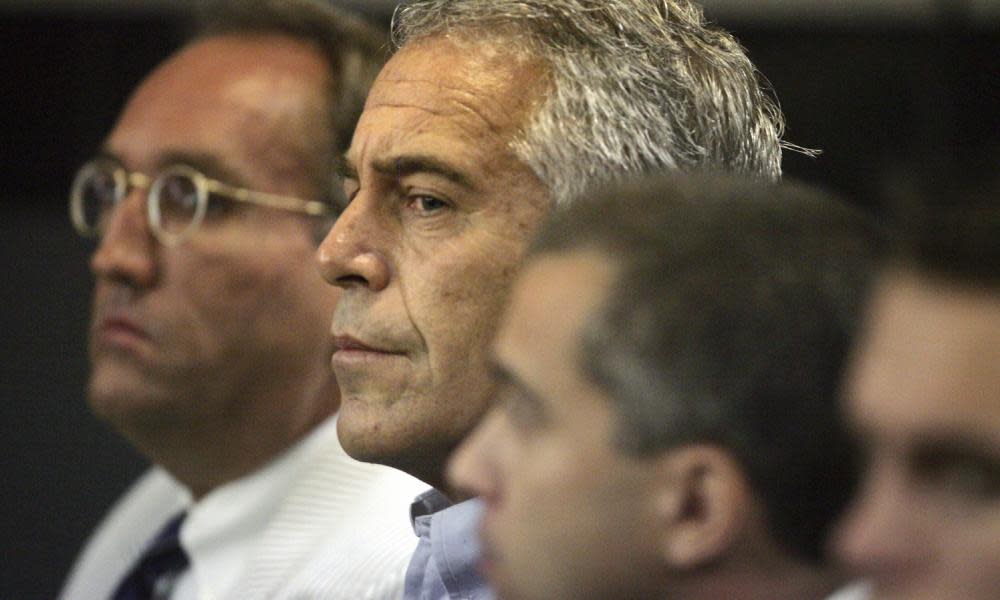Jeffrey Epstein investigation may target new suspects after financier's death

The death of Jeffrey Epstein in his New York jail cell is not going to stop authorities from further examining his alleged sex trafficking crimes – and may see the investigation widening and targeting new suspects.
In the wake of the billionaire’s apparent suicide on Saturday morning, his accusers voiced anger and regret that Epstein would no longer face them in court – and called for authorities to continue their investigation into others who might have been involved in a trafficking ring that targeted young girls for sexual abuse.
That call looks to have been taken up. Statements from authorities after Epstein’s death indicated potential co-conspirators were not off the hook.
William Barr, the US attorney general, said Monday: “Let me assure you that case will continue on against anyone who was complicit with Epstein.” He added: “Any co-conspirators should not rest easy. Victims deserve justice and will get it.”
New York authorities have echoed that sentiment.
“To those brave young women who have already come forward and to the many others who have yet to do so, let me reiterate that we remain committed to standing for you, and our investigation of the conduct charged in the indictment – which included a conspiracy count – remains ongoing,” Geoffrey Berman, the Manhattan US attorney, said in a statement.
Veteran attorneys interviewed by the Guardian said Epstein’s death would not impede federal prosecutors from pursuing conspiracy cases against others. They also said a controversial non-prosecution agreement agreed with Epstein’s legal team during a previous case was unlikely to now shield any co-conspirators from prosecution.
“The main fact that the head of the conspiracy has been lopped off or died does not negate the fact that [others] can be charged,” said the longtime criminal defense lawyer Murray Richman.
“Conspiracy is a secret agreement between two or more persons. They can focus on one person being the ringleader of that conspiracy but nevertheless, the other persons are involved in that conspiracy,” Richman explained.
“They’re all persons involved in the conspiracy and they’re all persons that can be charged – each and every one of them,” he added.
Rebecca Roiphe, a professor of law at New York Law School and former assistant district attorney in Manhattan, voiced similar sentiments.
“The fact that they brought a conspiracy charge indicates to me that they have other people in mind,” she said.
Indeed, numerous court documents point to others’ potential involvement in Epstein’s alleged crimes.
The Manhattan US attorney’s case against Epstein for alleged sexual abuse of minor girls as young as 14 includes charges of sex trafficking and sex trafficking conspiracy. Language in the indictment alleges Epstein “worked and conspired with others, including employees and associates who facilitated his conduct” in luring girls to his Manhattan and Palm Beach homes between 2002 and 2005.
Epstein’s controversial non-prosecution agreement with the former Miami US attorney Alexander Acosta – under which he pleaded guilty to state prostitution charges rather than more serious federal crimes for allegations involving dozens of minor girls – also said “the United States also agrees that it will not institute any criminal charges against any potential co-conspirators of Epstein … ”.
The paragraph then lists the names of four women and says its agreement is “not limited to” these named parties.
Ghislaine Maxwell, the British socialite and media heiress romantically linked to Epstein, has also been accused in civil litigation of recruiting Epstein’s young victims – an allegation she has denied.
Exactly how these others would fit into the investigation is unclear. Some may involve witnesses who were cooperating with investigators against Epstein – and whose cooperation is thus no longer valuable after his death – or they could be separate cases.
“What we don’t know is whether or not these third parties who were involved in the conspiracy were already working with the government, or whether they are indictments that were going to be brought later,” Roiphe said.
David Weinstein, a white-collar criminal defense attorney with Hinshaw & Culbertson and a former federal prosecutor in Miami, said Epstein’s death would not affect prosecutors’ attempts to prove others participated in a conspiracy.
Related: Barr criticises 'serious irregularities' at jail where Jeffrey Epstein found dead
“It’s the same evidence, the same witnesses,” Weinstein said.
Epstein’s death could actually lessen potential issues with evidence.
“The evidence that they’ve seized from him directly – the only person who can contest the seizure [as unlawful] could be Epstein, or somebody who lived with him,” Weinstein said.
“Now that he’s dead, he can’t challenge that. All of that becomes fair game.”
As for Epstein’s plea deal in south Florida 12 years ago, those interviewed were skeptical it would protect others from prosecution, since they weren’t direct participants in this deal.
“Him being dead, the agreement is meaningless because the other parties are not party to the agreement,” Richman said. “They’re the third-party beneficiary.”
Possible co-conspirators’ defense lawyers could still try using this deal to their clients’ advantage, arguing that the protections agreed in the deal still exist and extend beyond Florida. But the success of such an argument is not guaranteed to succeed.
“In a way, it’s an interpretation of document. The thing is that, I don’t know how these particular individuals would enforce an agreement they were not signatories on,” Roiphe said.
Possible co-conspirators’ lawyers could make an argument that “under contract law, that the government is breaching a promise that it’s made and that you have an interest”.
“I think that’s a stretch,” Roiphe said, “but it’s not an impossible argument to make.”
Accusers can also pursue civil cases against Epstein despite his death. In the US, litigants can sue deceased persons’ estates in order to win compensation.
The lawyer Gloria Allred, who represents some of Epstein’s accusers, told the Guardian: “We’ll file an action to vindicate their rights within the next 10 days.”

